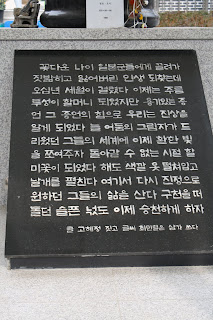
The past weekend Amy and I visited the House of Sharing with a group of international people. The House of Sharing is two things. It is first a home for ten "halmoni"s (grandmothers) who were forced to be "comfort women" or sex slaves for the Japanese soldiers. Second, it holds a museum that serves to spread word of what these women went through before, during, and most importantly after the enslavement. It was such an eye opening experience and a daunting task to write about. I've known for a while about the Japanese enslavement of Korean women and that this was why Korea-Japan relations are still rocky. But I never understood to what extent these women were abused and how appalling it is that the Japanese government to this day denies any involvement. I learned that the biggest thing I can do to support their cause is to spread the word of their experiences, and I'll try to do that here.
From 1932 until the end of the war, an estimated 50,000-200,000 women from all over Asia were captured by the Japanese military through kidnapping and deception; about 80% of these women were Korean and most of them under the age of 18. They were sent all over Eastern Asia, from China and Japan to Thailand and the Philippines. Japanese government acknowledges the existence of these brothels but denies any governmental involvement. They say that the women voluntarily entered these brothels, which proves impossible since most of the women were poor and would never have the means to individually go to such far away countries. They deny involvement even though all of the brothels had the same rules written in Japanese, same structures inside, and Japanese government stamps on all the documents.
In these "comfort stations," the women were raped, severely physically abused, and sometimes killed. They had to serve over 40 men every day who often ignored the rules and stabbed the women and often did not use condoms. The women were only given one condom to wash and reuse, but if they got pregnant, they were blamed and often fed mercury or even killed to serve as an example to others.
After the Allied forced took over, the women were technically free. However, most were stranded in foreign countries with no means of returning home and no means of survival. US soldiers attempted to help them, but found that since most of these women were taken at such a young age, surrounded by Japanese soldiers, and living in a foreign country, they had not developed efficiency in any one particular language. To this day, there are pockets of Korean communities in East Asian countries that formed after the liberation by korean women who could not return to their home country.
Since 1991, 220 former "comfort women" have formally come forward to demand an apology from the Japanese government. Many of these halmonis have become outcasts in Korean society by doing so, but still stand by their decision. Of those 220 women, only 97 are alive, most over the age of 90. They have been participating in a weekly protest in front of the Japanese embassy since 1992, but it is hard to deny that the halmonis are approaching their last years. It is the responsibility of their descendants and people of our generation world wide to support their cause until the Japanese government finally formally address the issue and apologize.
 "We must record these things that were forced upon us" -Kim Hak-Sun
"We must record these things that were forced upon us" -Kim Hak-Sun Taken away and abused by Japanese soldiers at a blooming age, it took fifty years to rediscover a lost life. Now I am an old grandmother covered with wrinkles, but with the strength of the powerful evidence we know the truth. The worlds of those affected that were filled with fear of the dark shadows are now shining with bright light. Although we have become grandmothers we put on our bright clothes and spread our wings here, where we can again reach for the lives we wanted. Let the sad spirits that floated in the heavens now disappear...
Taken away and abused by Japanese soldiers at a blooming age, it took fifty years to rediscover a lost life. Now I am an old grandmother covered with wrinkles, but with the strength of the powerful evidence we know the truth. The worlds of those affected that were filled with fear of the dark shadows are now shining with bright light. Although we have become grandmothers we put on our bright clothes and spread our wings here, where we can again reach for the lives we wanted. Let the sad spirits that floated in the heavens now disappear...For more information about this issue and the halmonis visit www.houseofsharing.org